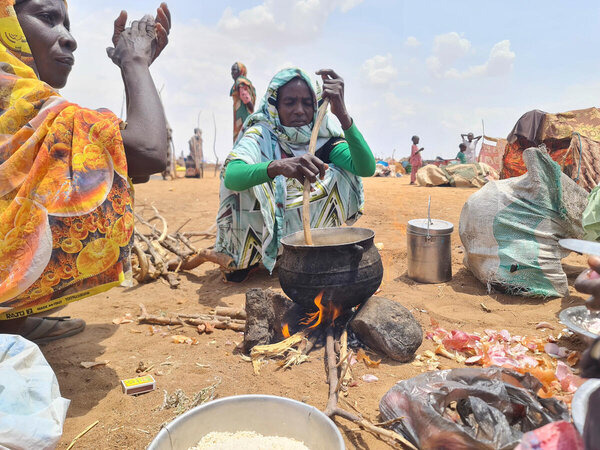People fleeing atrocities committed by the Rapid Support Forces (RSF) in the capital of Sudan’s North Darfur State, El Fasher, were eating animal feed out of desperation, Médecins Sans Frontières/Doctors Without Borders (MSF) Eastern Africa has reported.
The medical agency reported in a press release on Tuesday, witnessing extreme levels of acute malnutrition, in what it described as the most severe example of a malnutrition crisis that has gripped Sudan since the start of the war.
“In desperation, people were left with no choice but to turn animal feed into human food,” the statement reads in part.
It quotes a displaced woman in North Darfur saying: “We were so hungry we began eating ambaz (animal feed). At first it was free, then we had to buy it for SDG 20,000 per 1.5kg (US$8), rising to SDG 50,000 (US$20) in June.”
Those trying to bring food into El Fasher, MSF disclosed, were shot by the RSF.
For months, MSF teams in Tawila have reported treating malnutrition among patients who fled El Fasher, but malnutrition rates were now staggering.
MSF said that among children under the age of five who reached Tawila between October 27, when RSF seized control of El Fasher, and 3 November, over 70 percent were acutely malnourished, with 35 percent suffering from severe acute malnutrition.
“At the same time, 60 percent of the 1,130 adults MSF screened were acutely malnourished, 37 percent of whom were severely acutely malnourished,” MSF explained. “Malnutrition rates are even higher among pregnant and breastfeeding women.”
The agency’s findings corroborate fears that famine devastated people in El Fasher, which was besieged for more than 500 days. They also correspond with the recently released IPC report that found famine in El Fasher and in Kadugli, North Darfur.
Survivors arriving in Tawila reportedly described to MSF teams how life had become unbearable in El Fasher, with people having had no access to food, as community kitchens shut down, humanitarian aid was blocked, and markets were shelled and depleted.
Beyond El Fasher, MSF teams across Sudan have reported seeing a widespread deterioration in children’s nutritional status in recent months. The crisis is being fueled by overlapping factors, including inadequate food, disease, insecurity, lack of livelihoods, and unsafe living conditions.
“Right across Sudan, there is more that can be done to reduce the suffering caused by malnutrition. We call on all warring parties to allow humanitarian organizations safe and unimpeded access to increase services and help reduce this crisis,” said Myriam Laaroussi, MSF emergency coordinator.
According to the medical agency, the humanitarian response in Khartoum was still far below needs, with few organizations present and major gaps in both emergency aid and longer-term recovery efforts.
What’s more, it says, the true scale of the crisis was likely far worse than reported.
“Without warring parties granting safe and unimpeded access to people at risk, combined with increased funding and humanitarian support from international organizations, more children will be vulnerable to Sudan’s protracted malnutrition crisis.”




